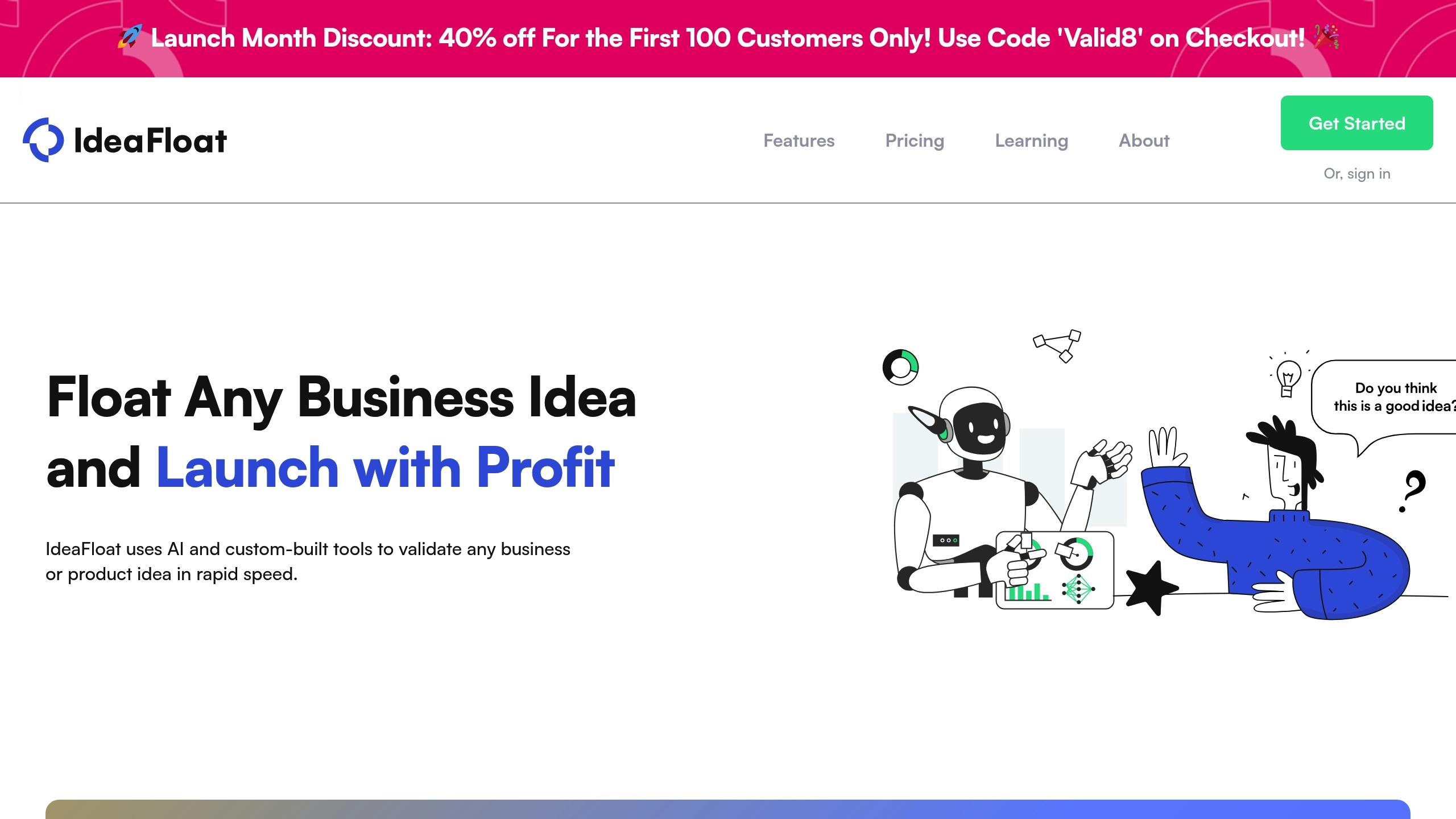
Achieving $10,000 in revenue in just 30 days is possible with the right plan. This guide breaks it down step-by-step:
- Focus Areas: Use affordable tools for market research, marketing, operations, and customer service.
- Key Success Factors:
- Ensure your product solves a real problem.
- Use automation to streamline tasks.
- Gather customer feedback to improve quickly.
- Quick Wins:
- Test your business idea using AI tools like IdeaFloat.
- Leverage local marketing, referral programs, and simple digital strategies.
- Low-Cost Tools: Use free tools like HubSpot, Mailchimp, and Google Analytics to keep expenses low.
- Revenue Growth: Upsell services, bundle offerings, and consider subscription models for steady income.
Quick Comparison of Tools
| Tool | Purpose | Free Option? |
|---|---|---|
| IdeaFloat | Market research & pricing | Yes |
| HubSpot | CRM & email tracking | Yes |
| Google Analytics | Website traffic insights | Yes |
| Mailchimp | Email marketing | Yes (up to 2,000 contacts) |
Start by validating your idea, launching smart marketing strategies, and focusing on customer retention. Follow this framework, and $10k in 30 days could be within reach.
Use This PROVEN Formula to Validate Your Next Startup Idea
1. Testing Your Business Idea
Use AI tools and validation techniques to quickly test your business idea, gauge market demand, and refine your concept.
Market Analysis with AI Tools
IdeaFloat offers tools to help you evaluate your business idea with actionable insights. The Market Size Assessment calculates your potential market value, while the Competitor Analysis tool identifies gaps you can leverage.
Here’s how you can organize your market analysis:
| Component | Tool/Method | Insights |
|---|---|---|
| Market Size | IdeaFloat Market Assessment | Total addressable market value |
| Competition | Competitor Analysis Generator | Gaps in existing services |
| Customer Demand | Customer Profiling Tool | Pain points and buying motivations |
| Price Points | Pricing Analyzer | Ideal pricing strategies |
These insights will help you better understand your target audience and market potential.
Finding Your Customer Base
IdeaFloat’s Customer Profiling Tool helps you create detailed customer personas using real market data. The key is to pinpoint pain points your business can solve.
Combine digital tools with direct engagement for the best results:
- Analyze social media to track industry-related conversations.
- Join forums or communities where your potential customers are active.
- Conduct short interviews to confirm your assumptions.
- Test small-scale versions of your product or service to gauge interest.
The more you understand your audience, the better you can tailor your solution to meet their needs.
Setting Your Business Apart
To stand out, you need a clear reason why customers should choose you. IdeaFloat’s Unique Value Proposition Generator helps craft this message by analyzing market gaps and customer needs.
Focus on a specific differentiator that solves a real problem. For instance, if you’re launching a service business, consider these options:
| Differentiator | Market Impact | Implementation |
|---|---|---|
| 24/7 Availability | Attracts busy professionals | Use automation for round-the-clock support |
| Specialized Expertise | Justifies premium pricing | Highlight industry-specific credentials |
| Rapid Response | Solves urgent customer needs | Build efficient workflows |
Finally, use IdeaFloat’s Validate Score to get objective feedback on your differentiators and fine-tune your approach.
2. Quick-Win Marketing Methods
Combine local outreach with digital marketing to bring in revenue fast. Let’s dive into how focused strategies can deliver quick results.
Local Marketing in Action
Tom's pressure washing business hit $10k in just 30 days by fine-tuning his Google Business Profile and boosting local SEO with well-chosen keywords.
Referral Programs That Work
Sarah scaled her virtual assistant service by offering clear referral rewards and using IdeaFloat's client management tools to automate the process.
Affordable Digital Marketing Tips
Attract customers without breaking the bank by:
- Crafting personalized content
- Engaging with local online communities
- Running targeted ads on small budgets
- Improving landing pages with strong calls-to-action and real customer testimonials.
3. Finding Customers on a Budget
You don’t need a huge budget to find customers - just focus on smart, cost-effective strategies. These approaches can help you connect with potential customers, form valuable partnerships, and use free tools to manage your business efficiently.
Direct Customer Outreach
Leverage IdeaFloat's Customer Profiling tool to pinpoint your audience and reach out effectively. By identifying market gaps and tailoring your messages to specific pain points, you can quickly connect with potential customers. The key is to craft messages that feel personal and address the needs of your target audience.
Business Partnerships
Partnering with other businesses can help you grow your customer base without spending extra money. Look for businesses that share your audience but don’t compete directly. A good partnership benefits both sides and adds value for customers.
Here’s how to approach it:
- Find businesses that complement your offerings.
- Work together on joint promotions that provide mutual benefits.
- Start small with a test campaign.
- Measure the results to see the impact on revenue.
Pair these efforts with free tools to make managing customer relationships even easier.
No-Cost Business Tools
Take advantage of free tools to handle customer management and communication without breaking the bank. Here’s a quick list of some useful options:
| Tool Category | Recommended Option | Key Features |
|---|---|---|
| CRM | HubSpot Free | Contact management, email tracking, basic automation |
| Email Marketing | Mailchimp | Free for up to 2,000 contacts, automated campaigns |
| Analytics | Google Analytics | Tracks website traffic and conversions |
| Social Media | Buffer Free | Schedules posts, offers basic analytics |
These tools can help you stay organized and connect with your audience - all without spending a dime.
sbb-itb-08dd11e
4. Increasing Sales
Grow your revenue by maximizing value from your current customers - without increasing marketing expenses.
Finding New Sales Opportunities
Use your CRM data to identify buying trends and spot chances to offer related products or services. Think about ways to expand your offerings that fit naturally with what you already provide. Here are a few ideas:
- Service Upgrades: Add premium features to your existing services.
- Package Deals: Combine related services into bundles for added appeal.
- Rush Services: Offer faster or specialized options at a higher price point.
Make sure to price these options strategically to reflect the extra value they bring.
Pricing for Profit
Use tools like IdeaFloat's Pricing Analyser to set prices that are both competitive and aligned with the value you deliver. Key factors to consider include:
- Your market position and competitor pricing
- The unique advantages of your services
- How much your customers are willing to pay
- Your costs and profit goals
Regularly review your prices based on customer feedback and performance data. Many businesses undervalue their services, so ensure your pricing reflects what you’re truly worth.
Building Monthly Revenue Streams
Turn one-time sales into consistent income by introducing subscription-based options. This approach not only stabilizes your cash flow but also strengthens customer loyalty over time.
Here’s an example of how you could structure subscription plans:
| Plan Type | Features | Target Customer |
|---|---|---|
| Basic | Essential features of your core service | Budget-conscious clients |
| Professional | Advanced features and extra support | Growing businesses |
| Enterprise | Fully customized solutions | Larger organizations |
When rolling out subscriptions, focus on delivering ongoing value. Use automation tools to handle recurring billing and keep communication with customers seamless.
Success Stories
Tom's Pressure Washing
Tom Martinez launched his pressure washing business in Atlanta with just a few tools and a focused local marketing strategy. By using local SEO techniques and optimizing his Google Business Profile with compelling before-and-after photos and positive reviews, he gained strong visibility in his community. Combining this with market research to refine his pricing and target profitable areas, Tom hit $10k in revenue within just 30 days.
Sarah's Virtual Assistant Business
Sarah Chen used her virtual assistant skills to cater specifically to tech startups. With the help of IdeaFloat's market analysis tools, she discovered a gap in the market for specialized technical support. She implemented a referral program that turned happy clients into loyal advocates, which helped her grow her client base rapidly. Her story highlights the power of combining data-driven decisions with smart client acquisition strategies.
These stories show how careful planning and targeted marketing can lead to impressive growth, even with limited resources.
Business Software Guide
IdeaFloat

IdeaFloat is a compact tool designed to help startups quickly generate early revenue. It focuses on validating ideas and creating actionable growth strategies.
Here’s what makes IdeaFloat stand out:
- Market Size Assessment: Identify profitable opportunities.
- Customer Profiling: Pinpoint your ideal client base.
- Pricing Analyzer: Fine-tune pricing for better revenue.
- Startup Cost Calculator: Keep startup expenses in check.
- Breakeven Analysis: Plan finances with clarity.
These tools are aimed at helping startups achieve revenue milestones right from the start.
IdeaFloat offers a free plan for basic business validation, while the Pro plan ($25/month) provides full access - perfect for reaching that $10k revenue target.
Additional Software Options
Pair IdeaFloat with other tools to boost revenue potential:
| Tool Category | Recommended Tools | Purpose |
|---|---|---|
| Market Research | SEMrush | Keyword research and competitor insights |
| Customer Management | HubSpot | Manage leads and run email campaigns |
| Analytics | Google Analytics | Track website traffic and conversions |
| Communication | Zoom/Google Meet | Host client calls and presentations |
| Sales Intelligence | Salesgenie | Generate leads and connect with customers |
Start with free trials to test these tools. Once they prove their worth, consider investing in paid versions that align with your business objectives. Combining the right tools can help you hit that $10k monthly revenue goal faster.
Conclusion: Month 1 Action Plan
Main Points
Use AI tools to validate your business idea and fine-tune your pricing. Focus on marketing strategies that deliver quick results while building strong customer connections. With these essentials in place, follow a clear week-by-week plan to stay on track.
Getting Started
Turn these steps into a practical action plan for your first month. The first week sets the tone for everything that follows.
Days 1-3: Business Foundation
- Conduct market research using AI tools.
- Set up essential software systems.
- Finalize your pricing strategy.
Days 4-7: Marketing Launch
- Activate your primary marketing channels.
- Set up tracking systems to measure performance.
- Start reaching out to potential customers.
Days 8-30: Growth Phase
- Review daily metrics to identify trends.
- Adjust your approach based on data insights.
- Focus on turning leads into loyal customers.
Take advantage of free trials before committing to paid tools. For example, start with IdeaFloat's free plan to test your concept, then upgrade to the Pro plan ($25/month) once you see market demand.
Use this framework to track your progress:
| Revenue Milestone | Target Timeline | Key Actions |
|---|---|---|
| First $1,000 | Week 1 | Launch your core service and secure your first clients. |
| $5,000 | Week 2-3 | Expand successful marketing efforts and introduce a referral program. |
| $10,000 | Week 4 | Refine pricing, upsell to current customers, and broaden your offerings. |
Focus on activities that directly drive revenue and keep a close eye on your metrics to maintain momentum.
Related Blog Posts
Get the newest tips and tricks of starting your business!


